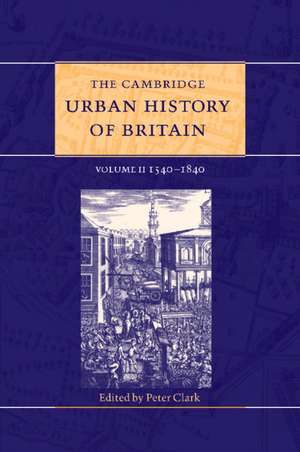The Cambridge Urban History of Britain: Volume 2, 1540–1840: The Cambridge Urban History of Britain
Editat de Peter Clarken Limba Engleză Paperback – 7 noi 2018
Preț: 407.55 lei
Nou
Puncte Express: 611
Preț estimativ în valută:
78.01€ • 84.76$ • 65.57£
78.01€ • 84.76$ • 65.57£
Carte tipărită la comandă
Livrare economică 21 aprilie-05 mai
Preluare comenzi: 021 569.72.76
Specificații
ISBN-13: 9781108740692
ISBN-10: 1108740693
Pagini: 964
Dimensiuni: 153 x 230 x 60 mm
Greutate: 1.39 kg
Editura: Cambridge University Press
Colecția Cambridge University Press
Seria The Cambridge Urban History of Britain
Locul publicării:Cambridge, United Kingdom
ISBN-10: 1108740693
Pagini: 964
Dimensiuni: 153 x 230 x 60 mm
Greutate: 1.39 kg
Editura: Cambridge University Press
Colecția Cambridge University Press
Seria The Cambridge Urban History of Britain
Locul publicării:Cambridge, United Kingdom
Cuprins
Preface; Plates; Maps and figures; Tables; Abbreviations; Acknowledgements; Introduction Peter Clark. Part I. Area surveys 1540–1840: 1. Introduction Peter Clark; 2. England: 2.1. East Anglia Penelope Corfield; 2.2. South east C. W. Chalklin; 2.3. South west Jonathan Barry; 2.4. Midlands Alan Dyer; 2.5. The north John Walton; 3. Wales Philip Jenkins; 4. Scotland T. M. Devine; Part II. Urban Themes and Types 1540–1700: 5. Towns in an agrarian economy Paul Glennie and Ian Whyte; 6. Population and disease, estrangement and belonging Paul Griffiths, John Landers, Margaret Pelling and Robert Tyson; 7. Politics and government Ian Archer; 8. Reformation and culture Vanessa Harding; 9. The urban landscape Michael Reed; 10. London Jeremy Boulton; 11. Great and good towns Paul Slack; 12. Ports David Harris Sacks and Michael Lynch; 13. Small market towns Alan Dyer; Part III. Urban Themes and Types 1700 to 1840: 14. Urban growth and economic change John Langton; 15. Population and society Pamela Sharpe; 16. Politics and government Joanna Innes and Nicholas Rogers; 17. Culture and leisure Peter Clark and Rab Houston; 18. The transformation of urban space Michael Reed; 19. London Leonard Schwartz; 20. Regional and county centres Joyce Ellis; 21. The ports Gordon Jackson; 22. Small towns Peter Clark; 23. Health and leisure resorts Peter Borsay; 24. Industrialising towns Barrie Trinder; Conclusion Peter Clark; Select bibliography; Index.
Recenzii
'The result is a useful compendium …' The English Historical Review
'On the whole few collected volumes contain so much good scholarship as does The Cambridge Urban History of Britain, and it will be, no doubt, the starting-point for any future research in the field of British urban history.' London Journal
'… the area surveys will doubtless prove to be of great value for students of landscape history, particularly for the purpose of contextualising local studies of towns and their hinterlands … this is an important, landmark publication in British urban history … every county and city record office should have one, for not only will The Cambridge Urban History of Britain volumes become the first port of call for landscape historians starting out with a new research project, but they doubtless will become the authoritative yardstick against which to check and compare our work.' Society for Landscape Studies
'On the whole few collected volumes contain so much good scholarship as does The Cambridge Urban History of Britain, and it will be, no doubt, the starting-point for any future research in the field of British urban history.' London Journal
'… the area surveys will doubtless prove to be of great value for students of landscape history, particularly for the purpose of contextualising local studies of towns and their hinterlands … this is an important, landmark publication in British urban history … every county and city record office should have one, for not only will The Cambridge Urban History of Britain volumes become the first port of call for landscape historians starting out with a new research project, but they doubtless will become the authoritative yardstick against which to check and compare our work.' Society for Landscape Studies
Descriere
This volume examines when, why, and how Britain became the first modern urban nation.





